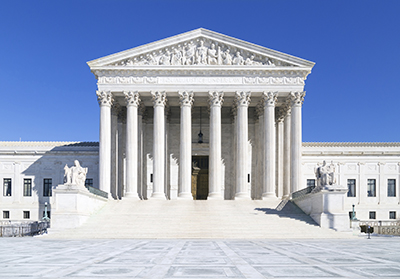In this three-part series, we are exploring the major employment law cases that we are keeping an eye on for 2024. Our last article looked at two cases that have been briefed and argued before the U.S. Supreme Court. Now, we are turning our attention to major employment law cases that are awaiting oral argument in the Court, or a decision on whether it will grant a hearing at all. Here are two cases—one just accepted for hearing, the other waiting outside the Court’s door—that could have major effects on the rights of millions of American workers.
Awaiting briefing and oral argument: Harrow
On December 8, 2023, the Court announced it would hear the case of Harrow v. Department of Defense. Stuart Harrow, a longtime Defense Department employee, was furloughed in 2013 due to federal budget cuts. Harrow challenged the furlough (without a lawyer) before a Merit Systems Protection Board administrative judge, and then (still without a lawyer) appealed to the full Board when the judge ruled in the agency’s favor. Years rolled by as Harrow waited for his appeal to be heard, first because of a huge case backlog and then because the Board lost its quorum of members in 2017 and could not decide any appeals. When the Board finally regained a quorum and decided Harrow’s case in May 2022, it sent him only an email notice—but the Defense Department had changed Harrow’s address years earlier, and he did not get the notice until after the 60-day deadline to appeal to the U.S. Court of Appeals for the Federal Circuit. He appealed anyway, but the Federal Circuit dismissed his appeal as untimely, saying the deadline was “jurisdictional,” meaning a late filing barred the court from hearing the case even as to whether Harrow’s late filing should be excused.
In 2019, in a case called Fort Bend County v. Davis, the Court took a more permissive view of a filing deadline, though under Title VII and not the MSPB statute. The Davis majority opinion, authored by Justice Ruth Bader Ginsburg, held that an employee’s initial deadline to file Title VII administrative complaints was not an absolute “jurisdictional” rule but was a mere “claims processing” rule that could be deemed waived if, for instance, the employer raised the issue unreasonably late. Justice Ginsburg died in 2020 and was immediately replaced by ultra-conservative Justice Amy Coney Barrett. Nevertheless, the reasoning of Davis still stands until the Court decides otherwise, and Mr. Harrow’s arguments under the MSPB statute are in some respects strikingly similar to those that succeeded for Title VII in Davis.
The precise question presented in Harrow is whether the 60-day deadline for federal employees to appeal final MSPB decisions to the Federal Circuit is a “jurisdictional” rule that only Congress can alter, or a “claims processing” rule that courts can waive under extenuating circumstances. The distinction can mean a world of difference to federal employees seeking relief from the courts after adverse MSPB rulings. Oral arguments in Harrow have yet to be scheduled, but are expected to take place in spring 2024. Until then, we have few clues about the current Justices’ thinking on this important issue.
Awaiting a Court decision whether to grant a hearing: South Carolina Ports
The Supreme Court typically receives thousands of petitions for review a year, and grants review—known as a writ of certiorari—in fewer than 100 of them. One currently pending “cert petition” that employment lawyers consider especially important is South Carolina Ports Authority v. National Labor Relations Board, a dispute over whether a labor union, here the International Longshoremen’s Association, was protected by—or instead violated—federal labor law when it responded to the Ports Authority’s refusal to employ union longshoremen by suing shipping companies to block them from using the Authority’s ports.
The union, echoed by the NLRB and the U.S. Justice Department, says it was within its rights to seek “work preservation” for its members, since its multi-employer contract barred shipping companies from subcontracting with non-union longshoremen. The Authority, and various other employer-side interests, say South Carolina had the right to hire non-union dockworkers directly as state employees, and claims the union’s suits against the shipping companies were tantamount to “secondary boycotts”—unlawful efforts to influence the state’s hiring decisions by depriving its ports of customers.
The U.S. Court of Appeals for the Fourth Circuit decided last July that the union was acting within its statutory rights. A grant of Supreme Court review here would be ominous, because there is no true split among the federal appeals courts for the Court to resolve, meaning the Justices might be interested in reversing purely for ideological reasons. We know the Court’s new majority has anti-union inclinations, but we do not yet know how deep they run. If the Justices decide to hear the case—and it takes only four to grant cert, whereas it takes five to reach a result—the question may not be whether the pro-labor ruling below is reversed, but how broad or narrow the ultimate decision will be. We will know in the next few weeks whether the Court intends to take and decide the case this Term.
Margaret House, an associate with Kalijarvi, Chuzi, Newman & Fitch, P.C., advocates for employees facing illegal and unfair treatment in the workplace, including employment discrimination, retaliation, harassment, and whistleblower retaliation. She can be reached at mhouse@kcnlaw.com.
Stephen “Steve” Pershing, of counsel to Kalijarvi, Chuzi, Newman & Fitch, P.C, is an experienced litigator who has developed and litigated civil rights and liberties cases. He can be reached at spershing@kcnlaw.com.

